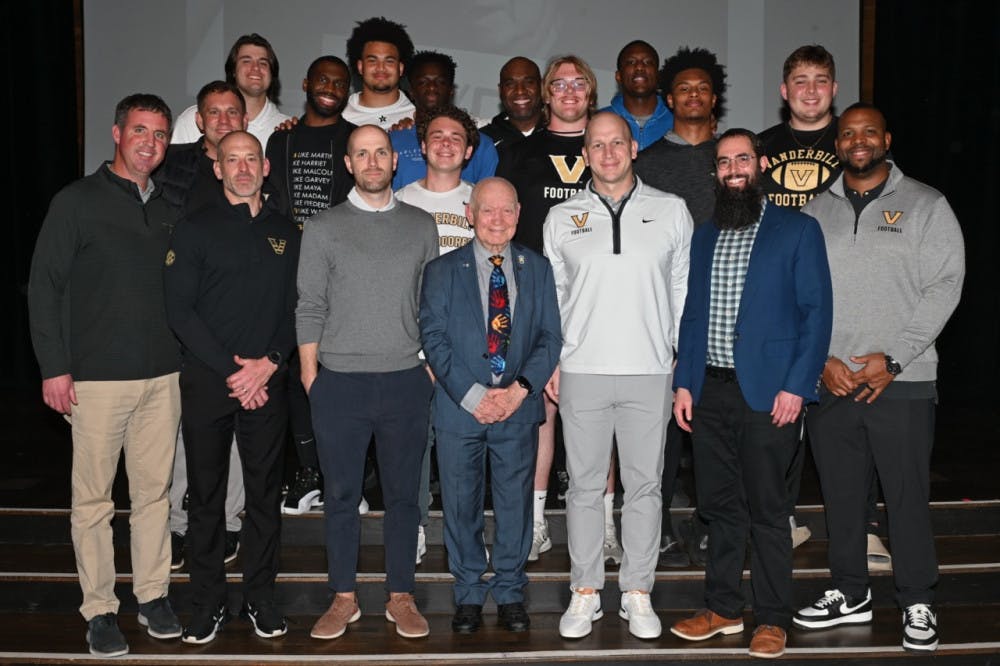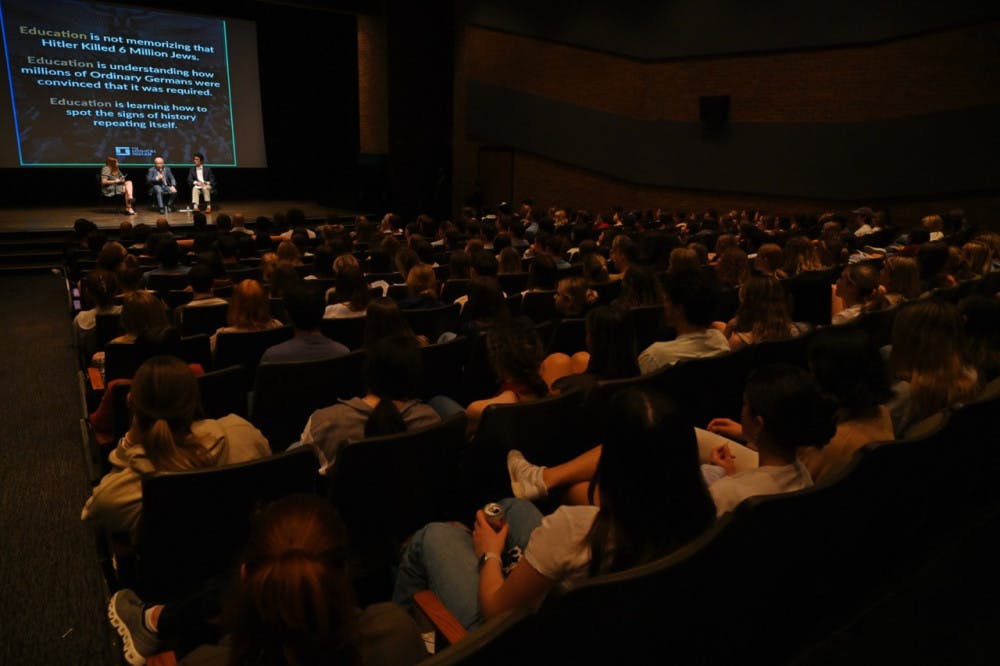
pictured l. to r. Rabbi Shlomo Rothstein, Max Perry, Steigmann, Sarah Fischer, Haley Gochnauer
Antisemitism is known as the oldest hate. If Antisemitism is considered old, why does society still battle Jewish hatred in today’s world? Vanderbilt University’s Jewish community has been an active participant in fighting Jewish hate. Vanderbilt Chabad, a Jewish organization on campus brought to the university by Rabbi Shlomo Rothstein and Nechama Rothstein, has made significant strides in diminishing Antisemitism through educating and reunifying students.
This past Fall, a Vanderbilt football coach posted a hurtful and insensitive comment on social media that deeply wounded the Jewish community on campus. Vanderbilt Chabad was dismayed to discover the Antisemitic behavior conducted by a Vanderbilt staff member. Various Jewish students and alumni reached out to Chabad expressing their uneasiness and concerns about evolving Antisemitism at the university. While the Vanderbilt football coach’s remarks negatively affected the Jewish community, Vanderbilt Chabad was eager to amend division between Vanderbilt athletics and Vanderbilt’s Jewish population.

Sami Steigmann pictured center, with Vanderbilt football coach Clark Lea, right, Rabbi Shlomo Rothstein, and members of the football team
This semester, Vanderbilt Chabad took initiative to fight Antisemitism through bringing a Holocaust survivor to speak to students on campus. Chabad partnered with Stories that Live, a fellowship program that connects college students with Holocaust survivors, to host Sami Steigmann, a survivor and motivational speaker, to share his story, information about the Holocaust, and how to combat modern Jewish hate. Chabad organized a large lecture in which Steigmann provided his insights to an overflowing auditorium of students. Furthermore, Steigmann’s lessons functioned as a great opportunity to educate the Vanderbilt football team and staff about Jewish history and discrimination.
Vanderbilt Chabad scheduled a meeting with the entire Vanderbilt football department. The staff was enthusiastic about meeting with the organization and extended their all-team meeting to bring in Steigmann. The players were attentive and actively engaged in the talk as Steigmann asked them questions. After the speech, the team and staff, including the football coach who had posted the upsetting comment, expressed their genuine appreciation for Steigmann and his valuable message. David Seigel, a member of the team, stated, “As a Jewish football player, it was amazing to have Sami come and talk to the team. He gave an meaningful speech to us about unity.” Chabad invited the entire department to Chabad’s central event with Steigmann happening the following day.
The main event took place on February 22 at Vanderbilt University’s Sarratt Cinema. Vanderbilt Chabad devoted a great deal of time and energy to ensure the success of Steigmann’s lecture. Chabad’s student executive board collaborated with their general board to market and promote the event to various communities on campus. Chabad additionally guaranteed the involvement of Greek life through arranging brief sessions with fraternities and sororities during their chapter meetings. The organization was truly committed to creating change at Vanderbilt through education and unity.

Sami Steigmann spoke before a packed auditorium at Vanderbilt University.
Vanderbilt Chabad’s hard work and dedication was rewarded with a large attendance of both Jewish and non-Jewish students. Prior to the event, Chabad had to limit attendance to 300 as they reached the maximum capacity for the auditorium. Yet, students who did not RSVP still attended along with several of the football players and their coaches. The line to check in to the event wove throughout the entire first floor of the Sarratt Student Center. One could physically feel the excitement and anticipation that filled the building. In total, there were 372 members of the Vanderbilt community present to learn and grow by listening to Steigmann’s lecture. The attendance was a major accomplishment for the organization as it demonstrated the students’ commitment to becoming educated on the ongoing battle against antisemitism.
The smooth operation of the event can be attributed to Chabad’s executive board and members of the general board. These students assumed responsibility to ensure the event went smoothly. They tracked attendance, assembled and worked the refreshment tables and schmooze stations, and served as ushers. Chabad would like to recognize executive member Joshua Weingarten for arranging the live stream and recording of the event. The organization is truly appreciative of all the members who assisted with the logistics.
Chabad President, Haley Gochnauer, opened the event with words of welcome and announced the significance of the event in terms of the Hakhel year, a year that occurs once every seven years on the Jewish calendar that encourages everyone to unite together. The Hakhel year is a great opportunity to promote friendship, unity, and gathering. Chabad brought the university’s community together in the spirit of Hakhel.
After the introduction, Max Perry, a general board member, and Sarah Fischer, an executive board member, began the moderated conversation with Steigmann. They asked Steigmann questions about his experiences, his motto in life, and ways to overcome Jewish hate.
One lesson Steigmann shared is the importance of fighting hatred in unison. He discussed how the Holocaust began with the othering of Jews and that today’s society is witnessing this trend again as numerous communities are Anti-Jew and Anti-Israel. Steigmann proclaimed that all people, not just Jews, have a responsibility to fight and end Jewish hate in the same way that Jews have a responsibility to fight and end other forms of hatred. He expressed the effectiveness of our society fighting all types of oppression together.
Throughout his lecture, Steigmann emphasized the necessity of taking action to establish unity. Sarah Fischer said, “Sami and his story has empowered me to not be afraid to speak up and fight any form of hatred.” Steigmann’s messages were truly inspiring and unifying for Vanderbilt’s community.
Chabad is dedicated to ending Jewish oppression and hate. The organization fights this battle through teaching students ways to achieve understanding. By hosting Steigmann, Chabad effectively created a safe space where Vanderbilt students and staff could join together to fight antisemitism. Max Perry said, “It was incredible to welcome Sami to our community dedicated to stand against hate.”
Vanderbilt Chabad confronted antisemitic actions on campus through providing their community with a chance to learn and understand Jewish life. Rather than condemning the football program, Chabad mended the bridge by reaching out and offering Vanderbilt football a learning opportunity which they enthusiastically embraced.
Hayden Moses, a football player who attended the event, stated, “I think that Vanderbilt football taking such an active approach to Chabad’s event not only shows our support for the Jewish community, but our openness in learning and growing as a team alongside members of our community. Chabad’s ability to take a negative situation and use it as a learning opportunity highlights their leadership and integrity.”
Eric Freiman, a Jewish football player alumnus, asserts that, “Chabad took the exact right way to approach this, as the organization found a way to improve students’ understanding of Jewish history.” In all, Vanderbilt Chabad successfully brought awareness to antisemitism and gathered the university’s campus together in unity.
The Jewish Observer is published by The Jewish Federation of Greater Nashville and made possible by funds raised in the Jewish Federation Annual Campaign. Become a supporter today.
The best way to stay in touch with what is happening at Chabad is to follow us on Instagram - @ChabadVanderbilt!

